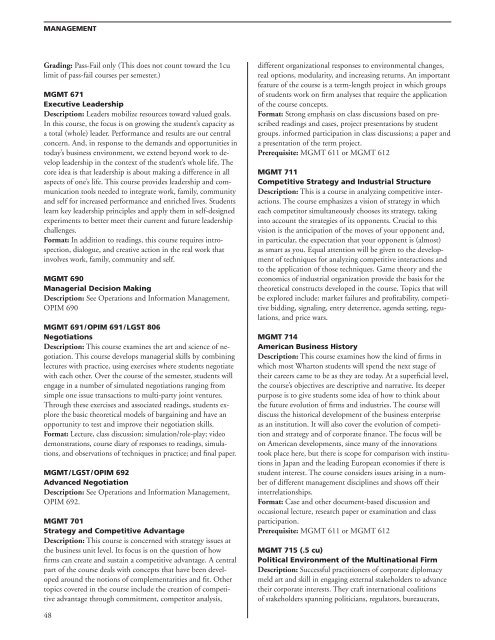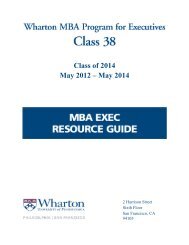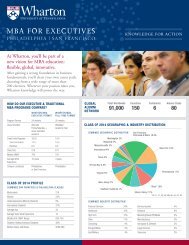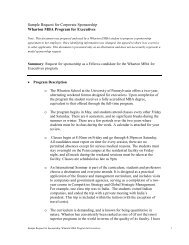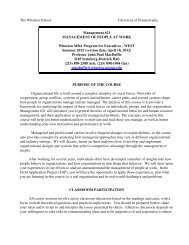Explore Options; Plan Your MBA Academic Program
Explore Options; Plan Your MBA Academic Program
Explore Options; Plan Your MBA Academic Program
Create successful ePaper yourself
Turn your PDF publications into a flip-book with our unique Google optimized e-Paper software.
MANAGEMENT<br />
Grading: Pass-Fail only (This does not count toward the 1cu<br />
limit of pass-fail courses per semester.)<br />
MGMT 671<br />
Executive Leadership<br />
Description: Leaders mobilize resources toward valued goals.<br />
In this course, the focus is on growing the student’s capacity as<br />
a total (whole) leader. Performance and results are our central<br />
concern. And, in response to the demands and opportunities in<br />
today’s business environment, we extend beyond work to develop<br />
leadership in the context of the student’s whole life. The<br />
core idea is that leadership is about making a difference in all<br />
aspects of one’s life. This course provides leadership and communication<br />
tools needed to integrate work, family, community<br />
and self for increased performance and enriched lives. Students<br />
learn key leadership principles and apply them in self-designed<br />
experiments to better meet their current and future leadership<br />
challenges.<br />
Format: In addition to readings, this course requires introspection,<br />
dialogue, and creative action in the real work that<br />
involves work, family, community and self.<br />
MGMT 690<br />
Managerial Decision Making<br />
Description: See Operations and Information Management,<br />
OPIM 690<br />
MGMT 691 / OPIM 691 / LGST 806<br />
Negotiations<br />
Description: This course examines the art and science of negotiation.<br />
This course develops managerial skills by combining<br />
lectures with practice, using exercises where students negotiate<br />
with each other. Over the course of the semester, students will<br />
engage in a number of simulated negotiations ranging from<br />
simple one issue transactions to multi-party joint ventures.<br />
Through these exercises and associated readings, students explore<br />
the basic theoretical models of bargaining and have an<br />
opportunity to test and improve their negotiation skills.<br />
Format: Lecture, class discussion; simulation/role-play; video<br />
demonstrations, course diary of responses to readings, simulations,<br />
and observations of techniques in practice; and final paper.<br />
MGMT / LGST / OPIM 692<br />
Advanced Negotiation<br />
Description: See Operations and Information Management,<br />
OPIM 692.<br />
MGMT 701<br />
Strategy and Competitive Advantage<br />
Description: This course is concerned with strategy issues at<br />
the business unit level. Its focus is on the question of how<br />
firms can create and sustain a competitive advantage. A central<br />
part of the course deals with concepts that have been developed<br />
around the notions of complementarities and fit. Other<br />
topics covered in the course include the creation of competitive<br />
advantage through commitment, competitor analysis,<br />
48<br />
different organizational responses to environmental changes,<br />
real options, modularity, and increasing returns. An important<br />
feature of the course is a term-length project in which groups<br />
of students work on firm analyses that require the application<br />
of the course concepts.<br />
Format: Strong emphasis on class discussions based on prescribed<br />
readings and cases, project presentations by student<br />
groups. informed participation in class discussions; a paper and<br />
a presentation of the term project.<br />
Prerequisite: MGMT 611 or MGMT 612<br />
MGMT 711<br />
Competitive Strategy and Industrial Structure<br />
Description: This is a course in analyzing competitive interactions.<br />
The course emphasizes a vision of strategy in which<br />
each competitor simultaneously chooses its strategy, taking<br />
into account the strategies of its opponents. Crucial to this<br />
vision is the anticipation of the moves of your opponent and,<br />
in particular, the expectation that your opponent is (almost)<br />
as smart as you. Equal attention will be given to the development<br />
of techniques for analyzing competitive interactions and<br />
to the application of those techniques. Game theory and the<br />
economics of industrial organization provide the basis for the<br />
theoretical constructs developed in the course. Topics that will<br />
be explored include: market failures and profitability, competitive<br />
bidding, signaling, entry deterrence, agenda setting, regulations,<br />
and price wars.<br />
MGMT 714<br />
American Business History<br />
Description: This course examines how the kind of firms in<br />
which most Wharton students will spend the next stage of<br />
their careers came to be as they are today. At a superficial level,<br />
the course’s objectives are descriptive and narrative. Its deeper<br />
purpose is to give students some idea of how to think about<br />
the future evolution of firms and industries. The course will<br />
discuss the historical development of the business enterprise<br />
as an institution. It will also cover the evolution of competition<br />
and strategy and of corporate finance. The focus will be<br />
on American developments, since many of the innovations<br />
took place here, but there is scope for comparison with institutions<br />
in Japan and the leading European economies if there is<br />
student interest. The course considers issues arising in a number<br />
of different management disciplines and shows off their<br />
interrelationships.<br />
Format: Case and other document-based discussion and<br />
occasional lecture, research paper or examination and class<br />
participation.<br />
Prerequisite: MGMT 611 or MGMT 612<br />
MGMT 715 (.5 cu)<br />
Political Environment of the Multinational Firm<br />
Description: Successful practitioners of corporate diplomacy<br />
meld art and skill in engaging external stakeholders to advance<br />
their corporate interests. They craft international coalitions<br />
of stakeholders spanning politicians, regulators, bureaucrats,


